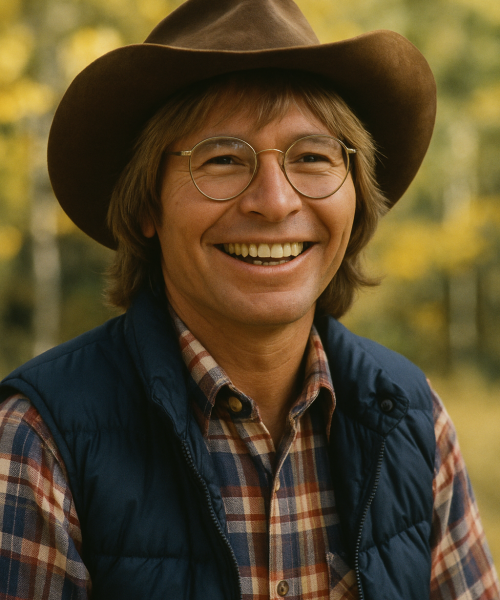John Denver, with his signature granny glasses, open smile, and unmistakable clear tenor voice, defined the 1970s with a music deeply rooted in nature, optimism, and global citizenship. Affectionately dubbed “The Folk Poet,” his simple yet profound songs spoke to the heartland and the mountains alike, delivering chart-topping hits like “Take Me Home, Country Roads” and “Annie’s Song.” He was an international phenomenon who effortlessly blended folk and pop, using his platform to advocate for a healthier planet. In this edition of Wednesday Chronicles, we explore the life, music, and enduring global impact of John Denver—the man whose songs gave us a Rocky Mountain High and inspired a generation to protect the Earth.
From Deutschendorf to Denver: The Making of "The Folk Poet
While millions instantly recognize the name John Denver, few know the man behind the music was actually born Henry John Deutschendorf, Jr. on New Year’s Eve, 1943. And contrary to the Rocky Mountain High image, he was not born in Colorado, but in Roswell, New Mexico. His father was a U.S. Air Force officer and record-setting pilot, meaning young Henry grew up moving constantly across the American West. This nomadic, structured upbringing provided him with two things: a deep sense of displacement and a profound appreciation for the landscapes he saw. The turning point came at age eleven when his grandmother gave him a 1910 Gibson guitar. Later, feeling his given name didn’t fit the folk world he wanted to conquer, he chose to honor the state he felt a spiritual kinship with, taking the name Denver. This decision wasn’t just about a name change—it was about choosing his identity, anchoring his wandering soul to the mountains, and setting the stage for his global career as “The Folk Poet.”
The Altitude of Success: Rocky Mountain High and Global Domination
The years between 1971 and 1975 saw John Denver ascend to one of the biggest stars in the world. He was more than a singer; he was a cultural phenomenon. During this period, he earned four Billboard No. 1 albums, including Back Home Again and Windsong, and delivered a non-stop string of iconic number-one singles: “Sunshine on My Shoulders,” “Annie’s Song,” and the quintessential “Thank God I’m a Country Boy.” His connection to the West was sealed with Rocky Mountain High, a song so beloved it became an official state song of Colorado. Denver redefined what a folk artist could be, moving far beyond the coffee houses. He starred in major films like Oh, God! opposite George Burns and hosted television specials that brought him into homes around the globe, cementing his status as a multi-platform, worldwide celebrity.
The Censored Song: John Denver Testifies on "Rocky Mountain High
Despite his wholesome image, John Denver unexpectedly found himself at the center of a cultural battle over censorship. Upon its release, his anthem “Rocky Mountain High” was cautiously banned by numerous radio stations across the country. The problem? Some conservative listeners and stations misinterpreted the word “high” to mean drug intoxication. This led Denver to take the unusual step of testifying before Congress in 1985, where he passionately defended his lyrics, explaining that the “high” was an innocent description of the spiritual peace and joy in living one feels when observing something as wondrous as a meteor shower in the mountains. This public fight secured his legacy not just as a singer, but as an artist who defended his work.
Beyond the Mic: The Global Citizen and Environmental Voice
John Denver’s activism was every bit as sincere as his music. He was one of the first major celebrities to consistently and publicly use his fame to advocate for humanitarian and environmental causes. His passion for the sea led him to write the song “Calypso” as a tribute to oceanographer Jacques Cousteau and his famous research vessel. He co-founded the Windstar Foundation dedicated to sustainable living, worked tirelessly on issues of world hunger, and even served on President Jimmy Carter’s Commission on World and Domestic Hunger. This passion for a healthier planet made him a true Global Citizen. He was also the first Western artist to do a multi-city tour of mainland China and even performed in the Soviet Union—using music to build bridges across political divides.
The Enduring Legacy: A Voice That Will Never Fade
https://en.wikipedia.org/wiki/Take_Me_Home,_Country_RoadsTragically, John Denver’s life was cut short on October 12, 1997, when the experimental plane he was piloting crashed into Monterey Bay. He was only 53. Though he passed too soon, his impact remains indelible. His simple, honest songs are woven into the fabric of American culture and nature conservation. His greatest hits are still cherished worldwide, a testament to his unique ability to connect with people through themes of love, peace, and the environment. John Denver’s legacy is that of “The Folk Poet,” whose music will forever remind us to take me home to the beautiful places that give us rocky mountain high feelings.
The Enduring Legacy: A Voice That Will Never Fade
Tragically, John Denver’s life was cut short on October 12, 1997, when the experimental plane he was piloting crashed into Monterey Bay. He was only 53. Though he passed too soon, his impact remains indelible. His simple, honest songs are woven into the fabric of American culture and nature conservation. His greatest hits are still cherished worldwide, a testament to his unique ability to connect with people through themes of love, peace, and the environment. John Denver’s legacy is that of “The Folk Poet,” whose music will forever remind us to take me home to the beautiful places that give us rocky mountain high feelings.
The Final Word: A Personal Note
John Denver’s music always felt like a simple, honest conversation. His songs are the soundtrack of the mountains, with a sense of optimism and sincerity that is timeless. To experience the heart of his work, revisit some of his essential albums, which are still played on classic rock and country stations around the world:
Poems, Prayers & Promises (1971) – Featuring “Take Me Home, Country Roads”
Rocky Mountain High (1972) – The title track defined an era.
Farewell Andromeda (1973) – Included the classic “Sunshine on My Shoulders.”
Back Home Again (1974) – Featuring “Annie’s Song” and “Thank God I’m a Country Boy.”
His dedication to the environment and to his craft created a legacy that will never fade. Thank you for joining me for this week’s edition of Wednesday Chronicles. I invite you to share your favorite John Denver memory or song in the comments below, and remember to follow and share to keep the conversation going.
The true measure of a folk hero is the ability to connect across generations. Stop and watch the performance that defined a sound and helped millions find their way home.
Disclaimer: This post is a personal tribute and commentary on the life and work of John Denver. ShauneNation.com is not affiliated with the John Denver Estate or any related entities. All music, images, and trademarks referenced belong to their respective owners. Content is for informational and entertainment purposes only.


